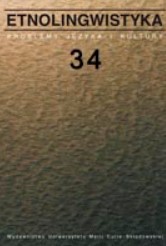Bitwa pod Matwami, albo Czy niepamiec jest etnolingwistycznie relewantna?
The battle of Matwy, or is non-memory ethnolinguistically relevant?
Author(s): Wojciech ChlebdaSubject(s): Comparative history, Military history, 17th Century, Pre-WW I & WW I (1900 -1919), WW II and following years (1940 - 1949), Politics of History/Memory
Published by: Wydawnictwo Naukowe Uniwersytetu Marii Curie-Sklodowskiej
Keywords: collective memory; non-memory; collective narcissism; Romantic paradigm;
Summary/Abstract: The notion of “(collective) non-memory” is understood here as facts (events, places, people, etc.) that have been for some reason removed from collective memory or disallowed by a given community to find their way to it. Ethnolinguistics usually deals with (systemic, textual, questionnaire-elicited) positive data, concerning facts, whereas the content on non-memory is not provided directly – it can only be arrived at with the use of special methodology. This kind of research must answer the question why a given community has removed certain facts beyond the boundaries of its memory (or has decided not to allow them in). Four facts from beyond the Polish collective memory are analyzed here: the battle of Matwy (1666), the Jedwabne pogrom, World War I, and the fate of Polish prisoners in German captivity (WWII). It is concluded that the reason why they have been relegated to the sphere of non-memory results from the pressure of the cultural code based on the Romantic paradigm: the paradigm is centred around the idea of the Polish nation being exceptional, innocent, and inviolable. The code thus prevents that paradigm from being violated or questioned by facts that do not align with it.
Journal: Etnolingwistyka. Problemy Języka I Kultury
- Issue Year: 34/2022
- Issue No: 34
- Page Range: 95-124
- Page Count: 30
- Language: Polish

